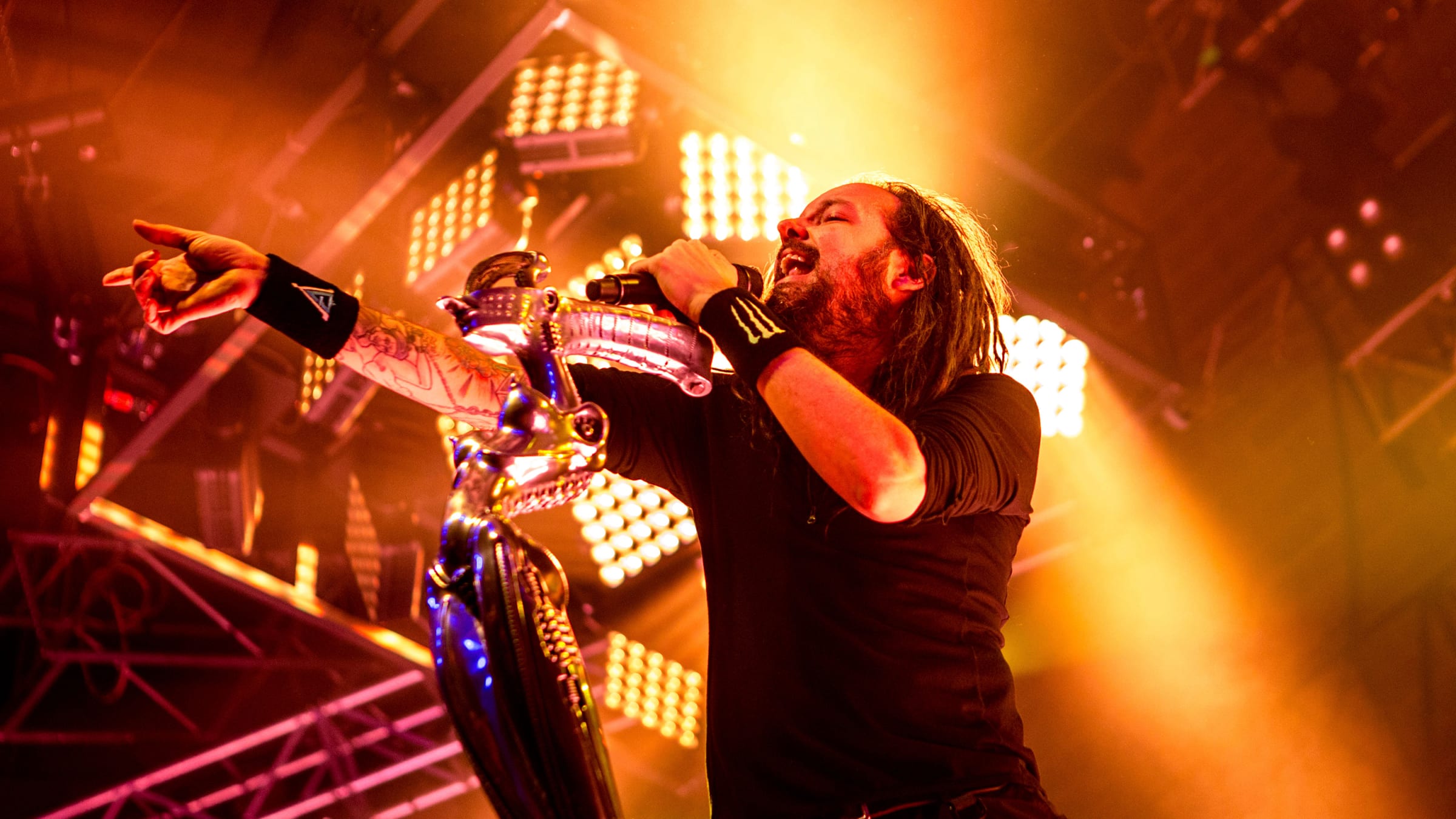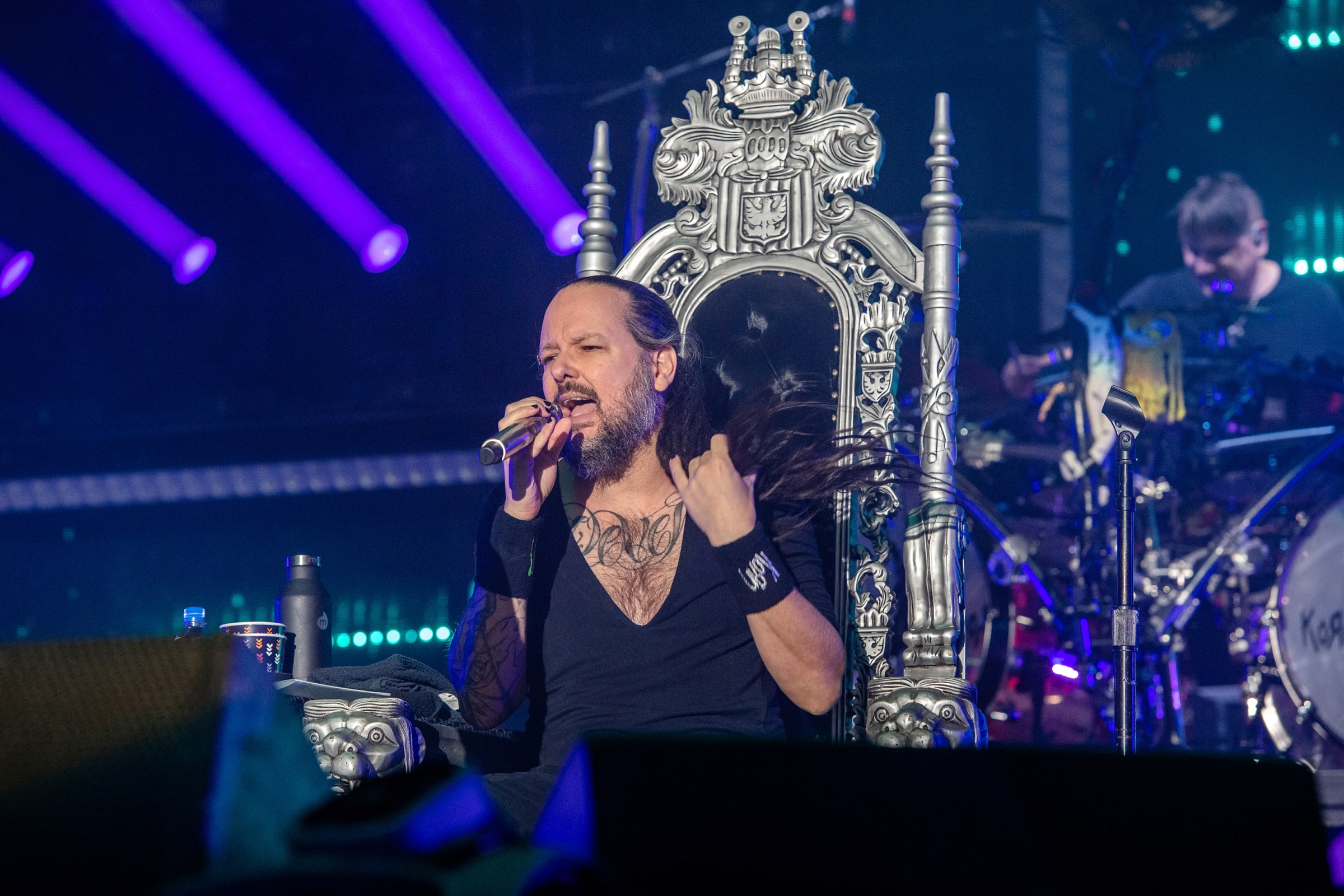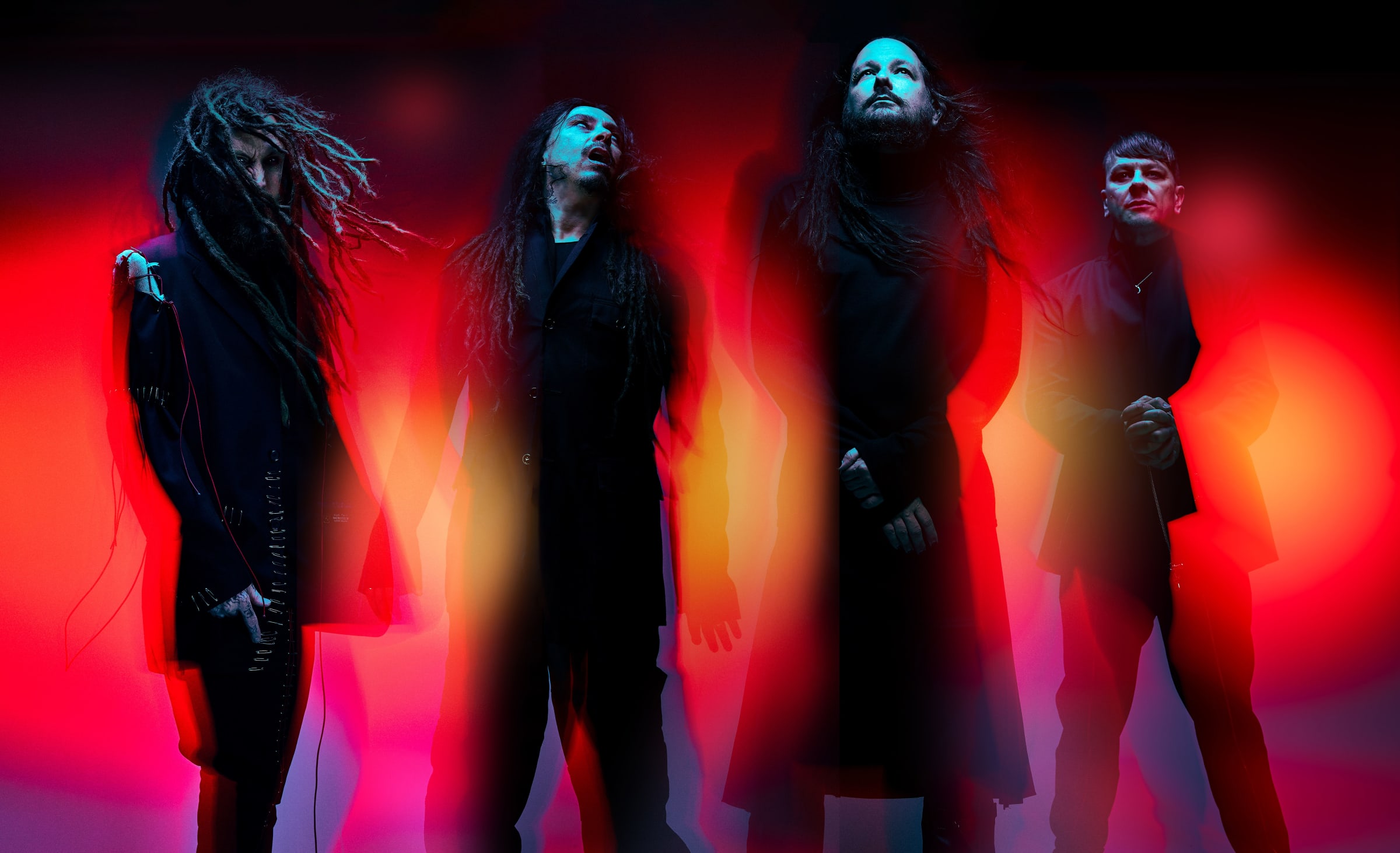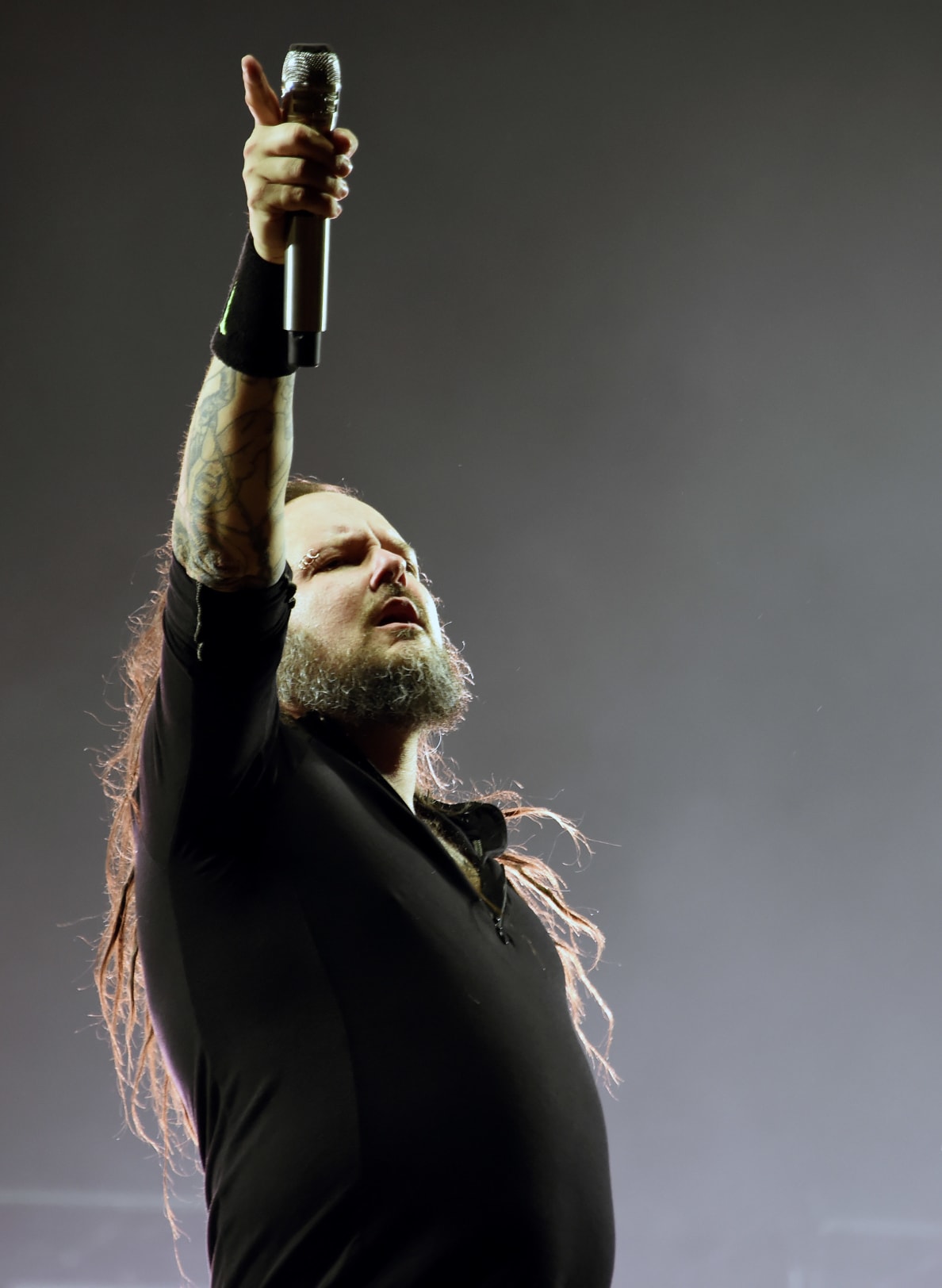Korn’s Having a Gen Z Moment. And Jonathan Davis Is Loving Every Minute of It.

Mairo Cinquetti/AP
The lead singer of Korn talks about the band’s enduring appeal, childhood traumas, and his most prized possession: a real shrunken head.
When elder millennials and Gen Xers discovered recently that Forever 21, the teen-targeting fast-fashion emporium, was hawking Korn band tees, they lost their collective marbles. How could this be? Do these kids even know what “A.D.I.D.A.S.” stands for? How old are we?!
As it turns out, the alt-metal band has attracted a dedicated following among the Gen Z TikTok set; the hashtag #korn has garnered more than 700 million views alone on the video-centric social network, and viral clips regularly crop up set to their angsty songs exploring youthful rebellion and childhood trauma.
“Fuck yeah they are!” exclaims lead singer Jonathan Davis. “It’s fucking rad.”
There was a time, in the late-’90s and early aughts, when Korn was the biggest rock band on the planet. Their third album, 1998’s Follow the Leader, sold 14 million copies worldwide and landed the group on the TRL countdown, right alongside pop acts like Mariah Carey and the Backstreet Boys. Issues, the band’s follow-up, even bested Dr. Dre’s The Chronic 2001 for the No. 1 spot on the charts.
Davis, who turned 51 this year, is pleased that Korn’s music is not only being absorbed by a new generation of teens but has been given a cultural reassessment by the critical community, who once sharpened its knives every time a new album hit the shelves. Korn’s latest LP, Requiem, received some of the best reviews of the band’s career, and Davis’ mercurial voice, oscillating between guttural growls and scat-singing, still packs plenty of punch.
The Bakersfield, California, native, who’s battled substance abuse throughout his career, says he’s in a much better place these days (well, aside from the COVID recovery). He’s sober, freed from toxic relationships, and newly invigorated.
“I’m happy now. I’m not in hell. So, that was a new thing. I was stoked and excited about this,” he says of the band’s 14th studio album. “Next year will be our 30th anniversary of being a band. It’s crazy… I hope we can make it to 40 years.”
[This conversation has been edited and condensed for clarity.]
How are you doing these days? I heard you got your ass kicked by COVID.
I got my ass kicked. Thank God it didn’t go to my chest—no respiratory issues—but it was more just with insane weakness and anxiety. Mental stuff. I hadn’t had anxiety for years, and now it’s back full-on. And just… weird stuff with my heart, dude. That was really weird. But just being totally lethargic—I had to sit in a chair when I played, and all that stuff. I got all that going on, and it’s still going on. I don’t know if it’s long COVID or what, but I still haven’t fully recovered. I can sing, so that’s cool.
Damn. And you got it all the way back in August. What are the lingering effects?
I’m still weak. I still walk six miles a day, but whenever I’m trying to throw weights up or do what I used to do, I have no gas. I got back pains, so I got acupuncture. I’ve been doing stuff with vitamins, celery juice, IVs—that helped. But I just think this thing is nasty and takes a while to get out of your body.
I hope you feel better soon. You know, it’s funny because I’m 37 and I first heard Korn when I was maybe 10 or 11. The first song I heard from you guys was “Blind.” But now, all the Gen Z TikTok kids are repping Korn.
Yeah, I don’t know why. Maybe people look back at those times and think of how good the music was—or how different it was. There were so many different bands in the ’90s, and so many people could grab their band and it helped them get through. It’s just something that happens. I think it happens with every generation. It’s not just us. You see it with bands like Metallica, too. If you stay around long enough eventually things will come back around. People remember it, rediscover it, and introduce their kids to it.

Jonathan Davis of Korn performs at Louder Than Life Festival 2021 at Highland Festival Grounds on Thursday, Sept. 23, 2021, in Louisville, Kentucky. He is seated due to the long-term effects of COVID.
Amy Harris/AP
And we’re in an age now where there just aren’t that many bands.
That was gonna be my next thing. With the way the music business is now, there’s no more MTV and there’s no more outlets to help make these bands larger than life. You pretty much have to do it yourself now, and they don’t have the budgets they used to. You have to be someone like Kanye West who’s a billionaire that has the money to do these grand projects. That’s how the times are. The way music is consumed now has changed, and you can’t make any money at it like you did back then. All art suffers for it, but on the other hand, you don’t need a label and can put anything out there.
Kids my age were into you in the ’90s and early aughts but the critics were very unkind to Korn—and really toward nu metal as a genre. You don’t see that so much anymore. Time has made those snobby critics seem cynical, in my opinion. And now Korn has received the best reviews of the band’s career in the past five years.
Yeah, but… we don’t care about them. The whole band didn’t give a fuck. That was our attitude in everything we did—including our music and including our band name. Our fucking band name is Korn! And it was just to go against whatever anybody wanted us to do. I remember our manager saying, “If you name the band Korn, I’m not managing you.” We said, “OK, fine. We’re gonna name it ‘Larry’”—because his name was Larry—and he goes, “OK, fuck it. Go with Korn.” It was some shit like that. We did it our way or no way. We had a vision of what we wanted to do, and that’s what Korn became. We were trailblazing and doing something new, and then critics came out and called it “nu metal.” We didn’t want to be categorized, so we were like, “Fuck that. What are you calling us that for?” Now, I look back and think, “We pioneered a genre. That’s cool. Call us whatever the fuck you want.”
You guys have sold 40 million-plus albums so… the people have spoken.
When we came out, there was us and The Deftones, and then all these other bands came out and started doing it and it wasn’t really that good, man. It just kept getting stupider and stupider. And that to me was what “nu metal” was. It wasn’t us, the innovators of this stuff, it was all the bands that the major labels started signing like crazy to keep up with “the new trend.” That’s what bastardized it and made it kind of silly.
I’d read that the band name Korn came from the horror flick Children of the Corn and a weird sex story your friend told you when you were a kid.
There was no Children of the Corn. It was about these two gay guys who were felching each other and the guy blew shit all over his face, and when he opened his mouth, he had a corn kernel on his tongue. It was a story that was passed around Bakersfield in our small circle of people. With people around us who knew the story, you’d say “corn” and they’d go, “Damn, stop!”
It was the “2 Girls, 1 Cup” of its time.
[Laughs] Yeah. So, when we were thinking of band names, I’m like, “Corn.” It was stupid. We were like, fuck a name. Corn. And then Fieldy goes, “Yeah! Spell it with a ‘K.’” And I go, “Fuck yeah.” So, I grab a crayon and spell it like a little kid would spell it, with a backwards ‘R.’ Little did I know that that fucking thing would become so iconic! I did it with my left hand on a piece of ripped-up envelope. That’s how much thought was put into it.
I was thinking about Korn recently when Dr. Dre and Eminem performed at the Super Bowl. A lot of people probably forget this, but Issues was such a big album that it beat out The Chronic 2001 and Celine Dion’s greatest hits album. It opened the same week as those two, sold nearly 600,000 copies, and blew them out of the water.
I remember that! It blew us all away. We were like, OK! That was the first record I did sober, too. That was insane.
Before we get to Requiem, I heard you’re a big fan of horror movies. What are some of your favorites?
I mean, I really don’t have the fucking patience to sit down and watch a movie now. Most of my entertainment comes from video games and music. But when I was a kid, the most horrifying movie I saw that stayed with me forever was The Exorcist. And Suspiria. Salem’s Lot was another one. And Texas Chainsaw Massacre 2 with Dennis Hopper. I don’t know what it was about that one. It was this mix of comedy-horror and just off. It felt like something different.
I saw this movie Fire in the Sky in theaters when I was maybe 8 or 9 years old, and there’s this gnarly alien-abduction sequence that gave me nightmares. When I was a teenager, I saw Audition and that movie was incredible. One of my favorite horror flicks.
That shit was fucked up! That movie is incredible.
Korn’s new album Requiem is impressive. How did making it during the pandemic, and having more time and space to experiment, affect the end result?
Korn is a big machine, and we got used to it being the big machine, so it would be: tour, tour, go make a record, and we’re gonna book another tour before you make the record. So, the band would have all this time to write and send these songs to me, and then when it became my turn to do what I wanted to do it was, oh, there’s a fucking tour coming up so you’ve gotta get this shit done. At the time, I really liked the pressure because I just wanted to get shit done. When it got to the point of doing the rest of the records, I wasn’t really that involved. The guys would go make it and send it to me because I couldn’t be in the studio and had to be home with my kids due to all this crazy shit that was going on in my life at the time.
So, that was all out the door. We had no tour, nothing going on, no urgency, no idea even when we were gonna tour again, and I just wanted to see my dudes. I was going crazy. I’d been locked in the house for months, and Munky said, “We gotta write a record,” so we set it up. We would work 10 days and go home for 20 days every month. And we did that about four times till the record was written, and then it took two times to record it. Then, I went in and added all my melody lines and did the lyrics, and that took me another two months. The last album we wrote together all in a room was Untouchables, and there’s a certain magic when we’re all in there together. How the fuck is this our 14th record and we’re still making records like this?
It seems like the state of Korn is very strong.
Oh, it’s very strong. Those guys are my brothers, man. We get along. We have our little tiffs and disagreements, but we’re adults and can talk it out. We’re not like other bands who absolutely hate each other and can’t be in the same room together. I enjoy being around my brothers—and we’re already working on another one.

Tim Saccenti
You don’t scat as much anymore. Was that because it was hurting your vocal cords or something?
No, no, no, no. I could do that shit for hours. I don’t do the bagpipes a lot and I don’t do the fucking scatting a lot because everybody wants me too, and if I do it too much it’s gonna burn out. When I do it it’s special. I do it on every record, it’s just on one song and not throughout everything.
One song that really stuck out to me on Requiem was “Lost in the Grandeur.”
That’s my favorite song on the album.
It seemed personal—like it was you reflecting on a time in your life where you were blinded by fame. Was it inspired by a time where you lost sight of yourself?
Yeah. I lost myself in all this fancy shit I could afford. I was in a very crazy situation in my life in the past and a lot of bad shit was happening to me. I really lost my care for myself and care for everything because I didn’t want to lose all the fancy shit. I come from Bakersfield. Simple means, man. And then I became this big rock star and could afford anything that I wanted, and that changes you. And you lose yourself.
Are you referring to the Follow the Leader era?
Yeah. When that came out, we got this big deal, and I got all this money to where I could buy anything I wanted. So, I bought this big house, and I bought a Bentley and an iced-out 40-carat wristwatch and all that kinda shit. Now, I drive a Ford truck. I live in Bakersfield and enjoy art and video games. I don’t gotta be “flossing” for anyone.
That Follow the Leader era was when Korn made regular appearances on TRL, and two of Korn’s music videos were among the first TRL retired. It’s such a fascinating period that I don’t think we’ll ever see again. You had Korn, Mariah Carey, the Backstreet Boys, and Blink 182 competing for TRL countdown supremacy. I’m not sure we’ll see a metal band achieve pop stardom like that.
At that time, we were representing all rock bands and a lot of rock people hated it. I was like, hey man, people like it. I didn’t choose this. Y’all chose this. Hell, at least we were flying the rock flag high. We still are. There’s a lot of camaraderie in the rock-music world because… it’s never gonna be dead, but it isn’t what it was. It changed and evolved. I like the new rock-metal, which is this trap-metal stuff and all the stuff that’s going on with the young rapper kids. I didn’t really understand it until my kid sat me down, but it’s kind of the exact same shit that we did. It’s rebellious, heavy shit. Lil Uzi Vert, Ghostemane, all these people. They were all inspired by the scene because they were kids when we were on TRL. And if you go to their shows, it’s kind of like a rock show.
How do you feel about the state of the music industry in 2022? Bands don’t make much money off their music anymore and make almost all of it through touring.
It’s all touring. You gotta have a following and once you get out there you gotta tour, and that shit’s expensive. Labels used to give you tour support, and they don’t do that anymore. Sony used to give us tour support—they made an investment to put us out there and tour, and we’re still paying them back.
Wait… you’re still paying the label back for touring expenses?
We’ll always pay. There was, what, six albums? And I don’t know how many millions were spent promoting them and all that, and that all got billed back to us. So, we’ll be paying that in royalties forever.
How much are you paying back in royalties?
I don’t know, man. Back then, you were getting fleeced. It’s like what the fucking streaming services are doing now—but worse. It was like, OK, we’ll give you $100,000. Instead of paying us back $100,000, we’ll give you a 13 percent royalty rate that will go toward the $100,000 and the rest we’re keeping. So, we’re paying it back at this small percentage rate going back to that initial investment they made. It’s wack.
I remember the cover image from Korn’s first album—of a young girl staring up at a monster—to be pretty haunting. And that image of a young girl soon became synonymous with Korn.
Iron Maiden has Eddies and Korn has Korn kids. They represented our innocence as children, and the majority of my lyrics at the time were about childhood traumas and things I went through as a kid.
Korn was one of few bands when I was younger that shined a heavy light on child abuse.
It was taboo at the time to talk about that shit. But whatever. I had to get it out. It helped a lot of people. That was a crazy time, and when I think about that record… it’s such a dark fucking record. We played it in its entirety in 2014, for its 20th anniversary, and all of us got offstage and we looked at each other and were like “God, that record is dark.” We hadn’t played it in its entirety in ages. And I don’t want to play that record again. Fuck no.
You mentioned the childhood traumas you endured as a kid, and I read that you had a very rough childhood. You almost died as a young child from asthma attacks, right?
Yeah. I was in a hospital from 3 to 12 about once a month for a week or two. It was scary. I had severe asthma, and to have asthma in the ’70s sucked. They’d give you all these drugs, like Quibron, which was basically like a speedball. And then they gave you Theophylline, which was basically like more speed. It was a big petri dish of drugs. I still have asthma to this day and use an inhaler, but it’s not like it was. Music was my therapy. It was. Every Korn album was my therapy. At every point in time, I’m working my problems out in the music. The way I write is stream-of-consciousness and me airing out to the world what I’m going through.
I wanted to ask you about the Korn song “Faget,” which was an early song I heard off Korn’s first album and was inspired by the bullying you went through and the names you were called. What memories does that song conjure up for you?
The unnecessary bullying and being called “gay” all the time. It’s getting a lot better, because who cares if you’re gay? Who cares what anyone does with their penis or vagina? It’s none of my fucking business! “Fag” became this derogatory term that was hurtful to gay people and weaponized against straight people. I got called it all the time. It got to the point where I didn’t care anymore. “Yeah, I’m a faggot. So what?” “Yeah, I wear eyeliner. What?”
Growing up in Bakersfield, it was very homophobic at the time. And I hung out with gay people because they had all the cool clothes and knew all the cool music. Because I was associated with those people, and dressed that way, all the jocks would pick on me. And that fucked me up. I was so fucked up in high school over that. I would even get called out of school and sent to the “gay counselor,” who was the music director, and he would say, “I know you’re not gay. I don’t know why you’re here.” I couldn’t have girlfriends because everyone thought I was gay. So, I became a DJ and that’s how I met other people who wouldn’t call me names. But that high school stuff, that really hurt me. I have a big, lasting scar in my heart from that.

Jonathan Davi of Korn performs during the second day of the Vive Latino music festival in Mexico City on March 17, 2019.
Alfredo Estrella/Getty
Is that why you spent so much time with dead people? Because I read that you worked as a coroner’s assistant as a teenager.
Yeah, maybe. I thought it was cool because I’ve always been into dark shit and I wanted to know what it was like to cut open a human being—and not go to jail. I was 17 years old.
You eventually stopped working in a coroner’s office, so was it a messed-up experience?
It made me appreciate my life immensely, because every day I would walk in and see someone young who was dead. But it was really intriguing at the time. I learned a lot from different doctors doing autopsies and learned a lot about anatomy and different ways you could die, but I didn’t know that it was giving me PTSD because I was chopping up kids and little babies and shit. That work just turned me into a cold motherfucker. It was very interesting, and I’m glad I did it because it gave me the balls to search for my dream because you only live once, but I don’t want to go back to it. Every morning I woke up to tragedy.
You also used to collect art from serial killers.
I have so much dark stuff—but I have so much light stuff. My house is full of dark stuff and light stuff now. Those are the things that inspire me and intrigue me. But you have to keep it balanced. If you swing too far in one way or another, it doesn’t work. You need harmony.
What is the wildest collectible you own?
[Laughs] Oh, I don’t know. I have all this crazy art. Human remains. Haunted dolls…
In addition to your microphone stand by H.R. Giger, what’s your most treasured collectible? Like, your house goes up in flames and it’s the first thing you grab.
Probably one of my shrunken heads. I have a real shrunken head from South America.
Wow.
I have my dolls, my paintings… I’ve got some restraints from the psych ward of Bellevue Hospital. I’ve got the first ticket from the very first Korn show before we were even signed! I have all my clowns and just… crazy stuff. You have to be here to see it!
